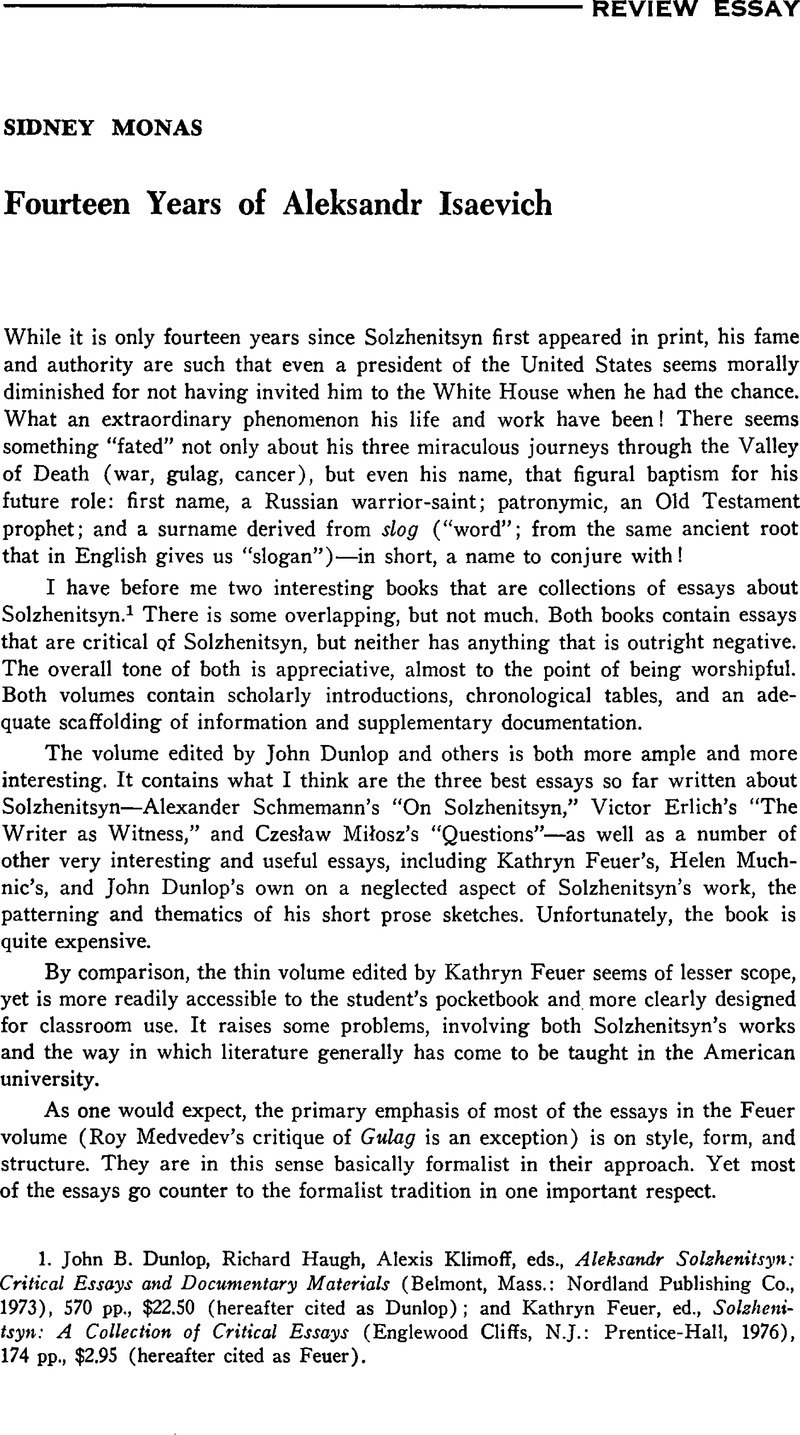No CrossRef data available.
Article contents
Fourteen Years of Aleksandr Isaevich
Published online by Cambridge University Press: 27 January 2017
Abstract

- Type
- Review Essay
- Information
- Copyright
- Copyright © Association for Slavic, East European, and Eurasian Studies. 1976
References
1. Dunlop, John B., Haugh, Richard, Klimoff, Alexis, eds., Aleksandr Solzhenitsyn: Critical Essays and Documentary Materials (Belmont, Mass.: Nordland Publishing Co., 1973), 570 pp.Google Scholar, $22.50 (hereafter cited as Dunlop); and Feuer, Kathryn, ed., Solzhenitsyn: A Collection of Critical Essays (Englewood Cliffs, N.J.: Prentice-Hall, 1976), 174 pp.Google Scholar, $2.95 (hereafter cited as Feuer).
2. Solzhenitsyn, A, “Nobel Lecture,” trans. Reeve, F. D. (New York, 1972), pp. 5 and 8–10.Google Scholar
3. Feuer, p. 163. Kaufman's essay, “Solzhenitsyn and Autonomy,” contrasts Solzhenitsyn's gift for “successful insubordination” (p. 161) with the contemporary intellectual's incapacity and dislike for making decisions.
4. Solzhenitsyn, A., et al., From under the Rubble , trans. Brock, A. M. et al. (Boston: Little-Brown, 1975, pp. 229–79.Google Scholar
5. Dunlop, p. 455.
6. Maximov, Vladimir, ed., Kontinent (American edition) (New York, 1976), p. 1976 Google Scholar; Solzhenitsyn, From under the Rubble, pp. 193-228.
7. The passage most emphatically cited by Borisov is from Rev. 21: 24-26. Solzhenitsyn, From under the Rubble, p. 205. “And the nations of them which are saved shall walk in the light of it [the City of God] and they shall bring the glory and honor of the nations into it.” The Russian says “narody”; yet Borisov refers constantly to natsiia (Iz-pod glyb [Paris: YMCA Press, 1974], p. 205). The Latin, gens, is not the same as natio; the koine Greek, ethnos, on the other hand, is the same word used today for “nation.”
8. Rieff, Phillip, Fellow Teachers (New York, 1972).Google Scholar
9. Feuer, p. 15.
10. Feuer, p. 5.
11. See especially Mich, Ivan, Tools for Conviviality (New York, 1973).Google Scholar
12. Dunlop, p. 326.
13. The phrase, in one or another variant form, appears in a number of Blackmur's essays. See especially his review of Ernest Simmons's biography of Tolstoy, where he discusses the constraints that bear on certain Tolstoyan ideas in Tolstoy's discursive prose, but which disappear from the more complex setting of the novels (R. P. Blackmur, “When there is a Tolstoy,” The Nation, January 25, 1947, pp. 103-4.
14. Brown, Norman O., Love's Body (New York, 1966), p. 160.Google Scholar
15. Dunlop, p. 449.
16. Feuer, pp. 34-46.
17. Dunlop, p. 326.
18. See, inter alia, Poulet, Georges, Studies in Human Time, trans. Elliott Coleman (Baltimore, 1956)Google Scholar; Bulhof, Francis, Transpersonalismus una” Synchronizitat (Groningen, 1966)Google Scholar; Fraser, J. T., The Voices of Time (New York, 1966)Google Scholar; Meyerhoff, Hans, Time in Literature (Berkeley, 1955).Google Scholar
19. Dunlop, pp. 45-62. See also Terrence Des Pres, The Survivor (New York, 1976). Reference Books of 1974-75: A Selection This is the second of a series intended to identify significant reference works on Slavic and East European topics. Some of these books may also be reviewed at greater length elsewhere in this journal. As an aid to verification, Library of Congress entries and card numbers are supplied when available. Books have been examined by staff members of the Slavic and East European Division of the University of Illinois Library at Urbana-Champaign, and annotations are signed with their initials. 1 GENERAL Birkos, Alexander S. East European and Soviet Economic Affairs: A Bibliography (1965-1973). By Alexander S. Birkos and Lewis A. Tambs. Littleton, Colo.: Libraries Unlimited, Inc., 1975. 170 pp. $10.00. LC 74-28495. Some 1, 168 articles, books, and pamphlets in English are listed without annotations in this selective bibliography. Contents of collections and symposia are not given, and the method of compilation is not explained. The extensive indexing provided seems disproportionate to the scope of the work.—LHM.


